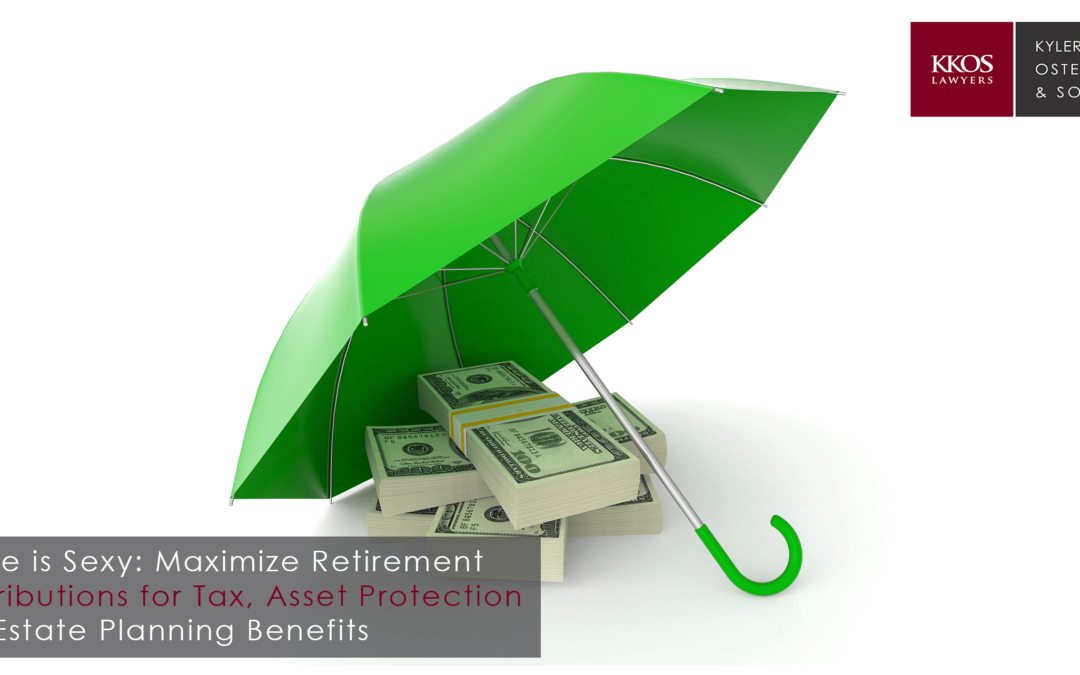
Many clients appreciate our ability to see the big picture. For example, when it comes to asset protection, estate planning, and tax planning, none of these practice areas happen in a vacuum, meaning the methods and tools used for asset protection will almost always affect and impact your estate plan and/or tax plan, for good and for bad, and vice versa. These areas should be coordinated together. While a lot of clients appreciate that, they often times overlook or fail to maximize the full benefits that come with funding and investing with a retirement account because it just doesn’t seem, well, sexy. Keep reading.
- Asset Protection. Effective asset protection rarely involves a transfer of all of your assets into some foreign off-shore jurisdiction. For many people, there are much less expensive and effective ways to protect your assets and one of those ways is to put your money into retirement accounts. So before you take other, more expensive, efforts to protect your assets, make sure you’re fully contributing to your retirement accounts because the funds inside your retirement accounts are generally protected from your creditors, though it varies from state to state in terms of the extent of the protection and the type of retirement account(s) e.g. ERISA v. Non-ERISA, etc.. Our office can help you determine the extent of the creditor protection based on your state and the type of retirement account but generally speaking all retirement accounts are protected from creditors at least up to $1M.
- Estate Planning. One of the primary purposes of setting up an estate plan is the ability to transfer assets upon your death without having to go through the probate court. One of the features of a retirement account is that upon your death it will directly transfer to whomever you listed on the account’s beneficiary designation form without having to go through the probate court! So at a minimum, make sure to keep your retirement account beneficiary forms updated. I am not suggesting you don’t need an estate plan at all, but if you fail to set one up, at least your retirement account would transfer upon your death without going through probate court.
- Tax Planning. It typically makes sense to sell an asset or receive income when you’re in a lower income tax bracket. There are all sorts of financial vehicles and instruments to accomplish these objectives, but once again, the “low hanging fruit” is to acquire assets and receive income into a retirement account. Presumably during your peak income earning years i.e., 30’s, 40’s, and 50’s, rather than paying tax on your income and then contributing in a taxable account where the income is taxable, you defer the income tax liability until your later years once you’ve retired, under the presumption that when you’re retired, you are in a lower income tax bracket, AND the contributions you made into the retirement account are tax deductible!! Plus, the money you would have paid in taxes stays in your account fully invested allowing the account to grow more quickly. Further, the REAL power of using a retirement account for tax planning is to utilize a Roth account because even though the contributions are not deductible, any qualified distributions are tax-free, even after your death! In other words, when that Roth account is inherited, no tax is paid on distributions to heirs, unlike with a traditional retirement account where in the hands of the heirs, distributions are taxed.
Here’s a fictional story to illustrate my point. Mart Kohlersen is 57 years old. He’s worked for 35 years and done very well for himself. He has an investment account portfolio worth $1.8M and owns a lot of toys (boat, ATV’s, RV’s, etc.). He owns his home outright which is worth $950,000 and has $10,000 in a retirement account because he figures he’ll live off his investment account and downsize his house when he retires if needed so he never bothered to put much funding into his retirement account. One day, while driving his ATV, he seriously injures somebody. His insurance is insufficient and he loses in the lawsuit. The plaintiff obtains a $1.5M judgment against Mart. His accounts are garnished and assets are sold, leaving him with a much smaller investment account and a much smaller house. And no more toys. To make matters worse, Mart died later that year without an estate plan, and for the next five years, his siblings and kids fought in probate court significantly and further depleting what assets were left/available. It’s a sad story, and he definitely would have benefited from some much better asset protection, tax planning, and estate planning, BUT, EVEN if he did nothing else different except fully contribute to his retirement accounts, here’s a much happier ending: If he would have fully contributed to a retirement account throughout his lifetime, a large portion of his net worth would be inside retirement accounts and thus protected from the aforementioned creditor, and thus remain intact to receive the tax benefits discussed above, AND said account(s) would have directly passed to whomever he named as the beneficiary(ies) without having to go through probate court!
In sum, I’m not suggesting that the ONLY investment vehicle should be your retirement account. There are annual contribution limits which make it impossible to put all of your funds in a retirement account. However, I am suggesting that if you will take advantage of fully contributing to your retirement account as much as possible, the RESULT is you will have a large account that has built-in, automatic features that provide creditor protection, estate planning, and tax planning. Our office is available to discuss your situation and make sure your estate plan, asset protection plan, and tax plan is well coordinated and includes taking advantage of this “low hanging fruit”.
